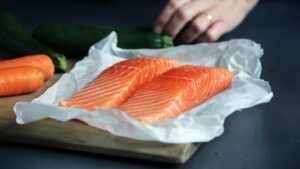Many of us have heard to cut carbs to lose weight. Several of us have heard, it’s not carbs; it’s fats you should limit. Often time’s protein gets a pass and “diets” are not going into too much detail as to how much and/or when you should consume protein.
“Nutrition experts recommend that protein accounts for 10-35% of all calories we eat” (IOM 2002). However, several experts (including myself) feel you should shoot for the 25-35% range. Protein is not only the main nutrient source to help rebuild muscle tissue, but it also helps with satiation (the feeling of being full). Being satiated longer leads to less cravings and a reduction in calories. Both of which are beneficial if you’re looking to lose some unwanted fat and/or weight.
Let’s talk about the when and how much!
Protein should be a part of all meals during the day. I personally believe you should try and eat 10-25 grams per meal for females and 20-35 grams for males (over the age of 19).
Douglas Paddon-Jones, PhD, professor at the University of Texas Medical Branch and a leading protein researcher suggests “it is best to distribute protein intake evenly throughout the day, starting with breakfast”.
I agree and feel that the best time to eat protein is a breakfast, post lifting and then throughout the day.
Over 40% of Americans skip breakfast and those that do, often times don’t get enough protein. Keep in mind your body has not had any fuel during the time you’re sleeping (6-10 hours) so when you wake up your body is in a catabolic state (wants to use muscle or whatever it can for fuel).
Getting protein in at this time will help prime your body to rebuild muscle and keep you full longer. Protein post workout is great with carbs (ideally a 1 Protein to 2 Carb ratio). This will help your body to start rebuilding as well.
While protein is often times not “the culprit” people blame for their weight gain and/or credit for their “weight loss”, it is a vital nutrient and should not be overlooked.
Spreading your protein out throughout the day will assure your body has adequate time to break it down and utilize it before refueling. Eating protein throughout the day will also keep you satiated and help with blood sugar.
Great sources of protein include: chicken, fish, turkey, lean red meat, cottage cheese, Greek Yogurt, protein shakes and eggs.
Vegetarian options include: plant based protein powder, plant based protein bars, beans, legumes, chia seeds and tofu.
Scott Keppel is the owner of Scott’s Training Systems, a world-class coaching facility in Chandler, Arizona. He is a nationally certified trainer through NASM and ISSA. His mission is to empower women of all ages and fitness levels. For more information head to scottstrainingsystems.com or check him out on Instagram at @stsnation.












